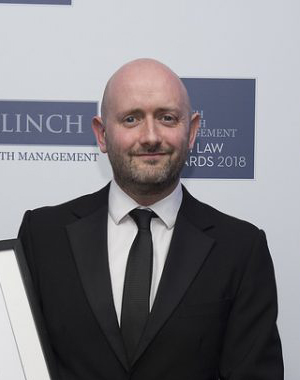Jason O’Sullivan: New food supplements tax shows incompetence on tackling health crisis

Jason O'Sullivan
Jason O’Sullivan, solicitor and public affairs consultant at J.O.S Solicitors, comments on the tax on food supplements introduced in Ireland this month.
The current bed shortage crisis escalating daily throughout Irish hospitals is unprecedented and unlikely to abate any time soon, despite questionable pledges by the Minster for Health Simon Harris to ease the pressure.
The Minister declared this week that 199 additional hospital beds will be available by the end of this month, a number which seems a tad insignificant given the latest figures showing 760 patients waiting for admission, surpassing the previous record of 714 patients set in March 2018, as based on data from the Irish Nurses and Midwives Organisation (INMO).
Both the Taoiseach Leo Varadkar and Minister Harris stated in their defence that such overcrowding has been exacerbated by the “very severe” flu season. There is little doubt the rampant flu epidemic currently sweeping the country has contributed to same, but also important to stress that such overcrowding and bed shortages is not a new phenomenon, but one that has become an annual thorn in the Minster’s brief.
For instance, the IMNO reported on 3rd January 2018 that the number of people on trolleys and wards awaiting a bed in Irish hospitals had risen to a then high of 677. While on 3rd January the previous year, a record of 612 patients awaited beds, showing this serious problem has escalated year on year.
With such knowledge within the Government and in particular the Department of Health, one would assume that all viable measures should be considered to reduce patient numbers into the future and look at other alternatives that may assist in the overall health and well-being of the Irish people, in particular supporting those who strive to make the right health choices regarding diet and exercise.
Instead of incentivising such health-conscious citizens, the Government instead decided to penalise them by introducing an unjustified tax on food supplements in last year’s budget. The measure came into force from January this year, which denotes a perverse irony given the current flu season has attributed to inexcusable overcrowding in our hospitals.
Value added tax (VAT) on food supplements was first announced by Revenue in December 2018, with plans to apply 23 per cent VAT to all such food supplements by 1st March 2019. This was deferred by Government to 1st November 2019 pending the outcome of public consultation which was published on 17th July 2019. There was much uproar at the time from representatives within the industry arguing the health and wellbeing benefits of food supplements, the negative economic impact for local business and the absence of a legal justification for the proposed change.
Despite such strong lobbying and consternation from those within the sector, Minister for Finance Paschal Donohoe still imposed a fiscal charge, setting it at 13.5 per cent, which came into force under section 55 of Finance Bill 2019 from 1st January 2020.
For legislative purposes, the definition of what constitutes a food supplement has been drafted in broad terms, enabling a greater catch of products within the VAT net. The Revenue Commissioners state in its guidelines:
“Food supplement products …for VAT purposes…are composed of nutrients or other substances with a nutritional or physiological effect. They are typically presented as tablets, pills, gels, liquids, drops, lozenges, capsules, powders, products for the preparation of beverages.”
The levy references sports and slimming food supplement products, as well as products which fall under immunity and general health boosters, including Vitamin C, calcium, garlic, omega 3 products right through to children’s multivitamins. In other words, all age groups are affected by this ill-judged and short sighted measure.
Some exemptions are applied to limited food groups which remain at zero VAT, such as infant formula, fortified foods (cereals and yogurts) and human oral medicines licensed or authorised as medicine.
Overall the introduction of this tax demonstrates a caviller attitude by the Government in penalising those who strive to lead healthier lives, which can only benefit the Irish health system longer term. Such disregard and disdain was clearly evident when Taoiseach Leo Varadkar criticised such food supplements as “snake oil” during questions on the issue last year. He subsequently rowed back on such comments and said “I may have done a disservice to the food supplement industry” and that while many food supplements had no proven benefit, “some of course do”.
Ironically the Government announced the tax on food supplements the same year it introduced the sugar tax on sugar-sweetened drinks. The sugar tax was justified by Government on health grounds, primarily aimed at funding public health initiatives that would help tackle obesity. Therefore it is quite baffling as to why Government failed to apply such sound logic when weighing up the health benefits of food supplements before imposing the tax in such a hypocritical manner.
It is clear, the health system in Ireland is broken and has been for too long, despite what soundbites Minister Harris may articulate to indicate the contrary. It is those on the ground, namely the hospital staff, GPs and patients throughout the country who tell a more factual story.
Joined up thinking between the Departments of Health and Finance is necessary in trying to find positive solutions to the systemic problems prevalent within Irish hospitals. Funding and resources are crucial to navigate a way forward, as are sustainable strategies for more efficient and effective healthcare for future generations.
With elements of the latter largely ignored by this recent fiscal charge, is it frustrating that the primary focus of this Government appears to be overly transfixed on the facile option of tax imposition. As the old adage goes, “nothing is certain except for death and taxes”.

- Jason O’Sullivan is a solicitor and public affairs consultant at J.O.S Solicitors.










